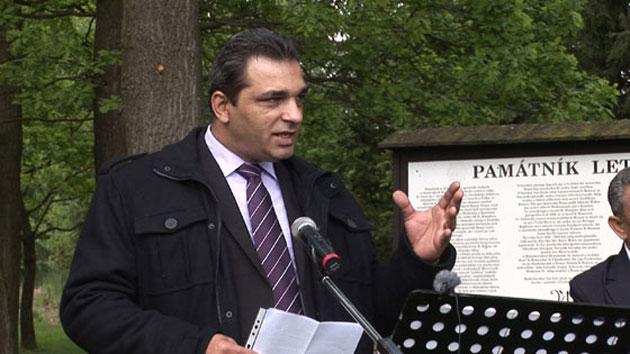Miroslav Kováč: International Romani Day is a day for Roma to present themselves

There is no doubt that Romani people are one of the largest minorities in the world. Their numbers in Europe are estimated at more than 12 million.
One of the few holidays celebrated by all Romani people is International Romani Day, which falls on 8 April. In the Czech Republic, since 1990 this important day for Romani people has been not just a holiday of Romani culture and customs, but also a day on which to present Romani history.
Romani people the world over have the opportunity on this day not only to remind themselves of their culture, customs, identity and language, but also to raise awareness of the hardships they have suffered and continue to undergo. On the one hand, Romani people comprise Europe’s largest minority, and on the other they are the group of people most at risk of poverty there.
The worst thing is that Romani people live in poverty in countries that are not only democratic, but economically and socially advanced. They live in poverty in countries that don’t just declare they uphold human rights, but in countries that also defend them.
How is it possible today that this particular group of healthy young people is exposed to social exclusion in these advanced, wealthy countries? What are the causes of this inter-ethnic animosity?
Such animosity is the real reason for Romani poverty. Majority populations are governed by ingrained stereotypes, intolerance, their own inadaptability and unwillingness to accept differences and diversity.
Nevertheless, we live in a multicultural world, and we are breaking down barriers to become part of the modern global order. The European Union is investing billions of crowns into Romani integration, even though the results of such investment are often the exact opposite of integration and, given the poverty and social position in which Romani people live, can seem pathetic.
According to research, Roma in the Czech Republic are essentially better off than elsewhere when it comes to education and employment, but more than one-third of them continue to live below the poverty line, in penury and squalor, in dilapidated buildings without sanitary facilities where they are exposed to different pressures from loan sharks, from any number of politicians, from institutional racism and from right-wing extremist groups. Such environments clearly lead to pathological phenomena such as drug use, higher crime rates, etc., and under such circumstances, Romani people will reject all emancipatory and integration processes, since espousing their Romani identity would be, in most cases, socially "explosive".
Successive governments have, of course, been making efforts to artificially emancipate these Roma; unfortunately, the rule of social explosiveness applies to those efforts as well. That is one reason why, during the last census in the Czech Republic, only 13 150 people registered as Romani (while 40 370 listed Romanes as one of their mother tongues).
When we compare the position of Romani people on the territory of the Czech Republic 25 years ago with today, we have no choice but to find that the situation has seriously deteriorated, even though the Czech Republic has ratified various international human rights treaties in the interim, even though the Constitution of the Czech Republic guarantees equal opportunities and rights to all, and even though the country has adopted an anti-discrimination law. The incorrect media environment here is simply widening the gulf between citizens of various backgrounds and aiding in the dis-integration of Romani people from Czech society.
Successive administrations, through their insufficient involvement of Romani people in integration, have spoiled all efforts financed in good faith by the EU Member States and even those co-financed from this country’s own budget. Today it is evident that majority-society politicians do not have the strength to lead the Roma out of this crisis.
Romani emancipation must come from within – the Roma alone must push themselves toward their own future. This is not an easy road, because it requires that most of us unite.
Every individual must aim to fight for better living conditions. We cannot rely on someone else to do this for us.
During the past 25 years, there have been plenty of opportunities for others in this country to help us. If we want to experience change in our lives, then we must learn how to read this society and how to live in it.
The results will not come immediately, and they won’t come tomorrow. They, will, however, come to pass!
Our children will be able to experience a change for the better, and we can be proud that we have prepared the way for them. The first basic step we can take – which costs us nothing – is to support Romani candidates in elections, enter into public life ourselves, and work in our own localities.
What we invest into our futures today will return to us exponentially in the future. The other option is that things can get even worse than they already are.
It is solely up to us which path we take. Romale ačhen vašamende u amen ačhaha vaštumende.
Džan, u kyden avri le Romen. Roma aven Jekhetane!